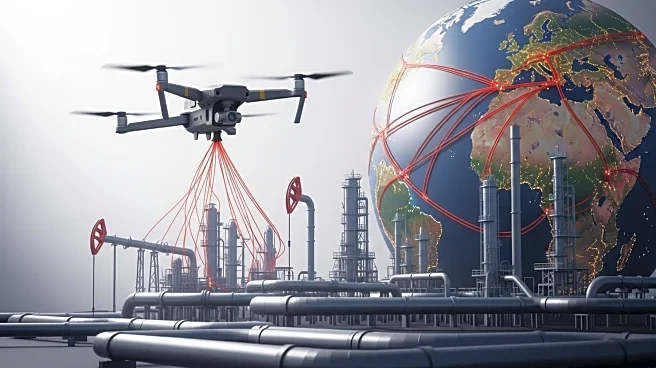What's Happening?
Recent developments indicate that Ukrainian drone strikes are significantly impacting Russian oil infrastructure, leading to potential shifts in global oil markets. These strikes have targeted Russian oil refineries and fuel depots, causing disruptions in Russia's ability to export petroleum products such as diesel, gasoline, and kerosene. The attacks are part of Ukraine's strategic campaign to weaken Russia's economic capabilities, particularly its war economy. The situation is exacerbated by Ukraine's increased attacks on Russian oil ports, which further hinder Russia's export potential. As a result, Russian refineries are being forced offline, and there are reports of severe fuel shortages in several Russian regions. This has led to increased domestic prices and potential internal unrest within Russia.
Why It's Important?
The ongoing conflict and resulting disruptions in Russian oil exports have significant implications for global oil markets. Russia is a major exporter of oil and gas, and any reduction in its export capacity can lead to increased global oil prices. The instability caused by these drone strikes adds to the geopolitical risks already present in the market, such as tensions in the Middle East and Russian aggression towards NATO. The potential for a decrease in global product availability could lead to tighter markets, affecting prices worldwide. This situation underscores the vulnerability of global energy markets to geopolitical conflicts and the strategic importance of energy infrastructure in modern warfare.
What's Next?
As the situation develops, global markets will need to adapt to the increased geopolitical risks and potential supply disruptions. OPEC+ may attempt to stabilize the market by increasing export ceilings, but their capacity to do so is limited. The effectiveness of Ukraine's military strategies, including the use of the new Flamingo Missile, will continue to play a crucial role in shaping the conflict's impact on global oil markets. Additionally, the response from major oil-consuming regions, such as Asia, will be critical in determining the market's direction. The potential for further escalation in the conflict or additional sanctions on Russia could further influence market dynamics.
Beyond the Headlines
The use of drones and precision strikes in this conflict highlights the evolving nature of warfare and its impact on global economic stability. The strategic targeting of energy infrastructure demonstrates the critical role of energy resources in national security and economic power. This development may prompt other nations to reassess their energy security strategies and the protection of critical infrastructure. Furthermore, the situation raises ethical questions about the use of military force in economic warfare and the broader implications for international relations.









